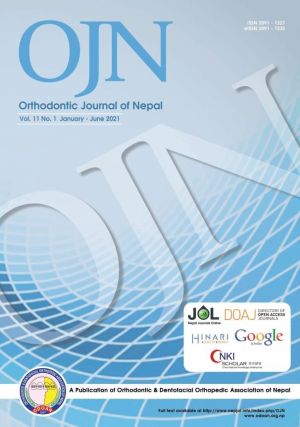Estimation of Dental Age by Demirjian and Willems Method in a Tertiary Care Hospital of Nepal
DOI:
https://doi.org/10.3126/ojn.v11i1.39084Keywords:
Age Estimation, Dental Age, Demirajian method, Nepalese Children, Willems methodAbstract
Introduction: Dental age estimation using orthopantomogram is very useful in pediatric dentistry, orthodontics in clinical diagnosis and treatment planning and also has forensic application. Demirjian method is widely used for age estimation and Willems method has been suggested to be accurate than Demirjian in various populations. To estimate the dental age of children in a specific population of Nepal by Demirjian and Willems method, compare them with the chronological age and assess their applicability.
Materials and Method: Digital orthopantomograms of 5 to 14 years of children were used to estimate the dental age by Demirjian’s 7- teeth method and Willems method. Descriptive statistics was used and mean with standard deviation was calculated for gender and age of the samples. Paired t-test was used for comparison of chronological age with dental age. P < 0.05 was considered as statistically significant.Pearson correlation was used to assess the correlation between chronological and dental age in both the genders.
Result: By Demirjian method, there was an underestimation of 0.276 years in males and 0.194 in females and by Willems method, 0.652 in males and 0.847 in females which were statistically significant. There was an underestimation of dental age in all the age groups except in the age group of 5,7 and 14 for Demirjian age which was statistically nonsignificant. Pearson correlation demonstrated strong positive correlation between chronological age and dental age.
Conclusion: The underestimation of dental age was more by Willems method as compared to Demirjian method. There was a strong positive relationship between chronological age and dental age in both the genders. Demirjian’s 7- teeth method was more applicable as compared to Willems method when tested in selected Nepalese children population
Downloads
Downloads
Published
How to Cite
Issue
Section
License
Copyright (c) 2021 Orthodontic & Dentofacial Orthopedic Association of Nepal

This work is licensed under a Creative Commons Attribution 4.0 International License.
Copyright © held by Orthodontic & Dentofacial Orthopedic Association of Nepal
- Copyright on any research article is transferred in full to the Orthodontic & Dentofacial Orthopedic Association of Nepal upon publication in the journal. The copyright transfer includes the right to reproduce and distribute the article in any form of reproduction (printing, electronic media or any other form).
- Articles in the Orthodontic Journal of Nepal are Open Access articles published under the Creative Commons CC BY License (https://creativecommons.org/licenses/by/4.0/)
- This license permits use, distribution and reproduction in any medium, provided the original work is properly cited.




